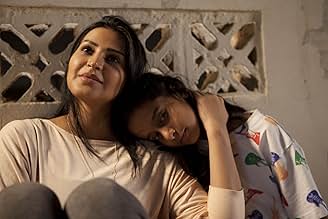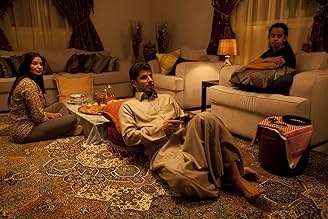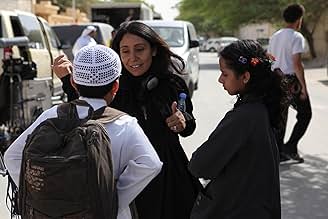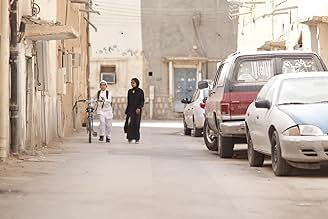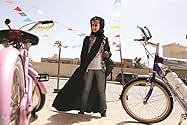Wadjda
- 2012
- Tous publics
- 1h 38min
NOTE IMDb
7,5/10
22 k
MA NOTE
Une fillette saoudienne pleine d'initiative s'inscrit au concours de récitations coraniques de son école dans l'espoir d'obtenir l'argent qui lui manque pour s'acheter le vélo vert qui a att... Tout lireUne fillette saoudienne pleine d'initiative s'inscrit au concours de récitations coraniques de son école dans l'espoir d'obtenir l'argent qui lui manque pour s'acheter le vélo vert qui a attiré son attention.Une fillette saoudienne pleine d'initiative s'inscrit au concours de récitations coraniques de son école dans l'espoir d'obtenir l'argent qui lui manque pour s'acheter le vélo vert qui a attiré son attention.
- Réalisation
- Scénario
- Casting principal
- Nomination aux 1 BAFTA Award
- 22 victoires et 36 nominations au total
Abdullrahman Al Gohani
- Abdullah
- (as Abdullrahman Algohani)
Sara Al Jaber
- Leila
- (as Sara Aljaber)
Avis à la une
We went to see this as a family, with our two daughters, 14 and 16. We all enjoyed it. Seeing how the limitations placed on women in Saudi Arabia play out in everyday life was of great interest to all of us. The story line depicted not only Wadjda's efforts to break free from her circumscribed world, but also how adult women struggle to survive. The effort to simply support oneself without a man when one can't even drive or wear clothes that allow for mobility reflects how rules ostensibly meant to "protect" women keep them dependent on men for the most rudimentary basics.
I suspect that even this film does not depict the lives of women in Saudi Arabia completely accurately. Some concessions seem to have been made to the government. No religious police are to be seen, for example. Nonetheless, it is well worth seeing, and we applaud Haifaa al-Mansour for making it. We look forward to her future work.
I suspect that even this film does not depict the lives of women in Saudi Arabia completely accurately. Some concessions seem to have been made to the government. No religious police are to be seen, for example. Nonetheless, it is well worth seeing, and we applaud Haifaa al-Mansour for making it. We look forward to her future work.
10-year-old Wadjda lives in Saudi Arabia. She's a bit rebellious, which means she wears basket shoes in school, listens to Western rock at home and has befriended a boy her own age. But she mustn't sing too loud, because the men can hear her and get offended.
Wadjda wants to go further and have her own bicycle, which invites trouble in her country. The story is told in a very warm way and you learn one thing. People in cultures totally different from yours are very much like you.
Realism here. Everyday people having everyday problems, but not the problems you have. A humanistic film, which makes it concerning everybody.
Wadjda wants to go further and have her own bicycle, which invites trouble in her country. The story is told in a very warm way and you learn one thing. People in cultures totally different from yours are very much like you.
Realism here. Everyday people having everyday problems, but not the problems you have. A humanistic film, which makes it concerning everybody.
The director Haifaa Al-Mansour tells the tale of a child called Wadjda whose wish is to have her own bicycle so that she might race against her friend and neighbour Abeer. The only problem is that Wadjda is a girl and girls in Saudi society do not ride bikes, which are considered "boys' toys" ... As we follow Wadjda in her quest to find the money to purchase the bicycle she sees being delivered on the roof of a van, we are introduced to her society and its culture and, in particular, its treatment of girls and women. Al-Mansour's portrayal of her country is shown without heavy judgement, although the bitter sweetness of being female is not concealed.
Filmed on location in Saudi Arabia, a feat in itself in a country that does not have a film industry as films are considered sinful, Wadjda's desire represents the wish for female freedom; her lack of a bicycle is mirrored in the adult women's inability to drive, prohibited for women in Saudi Arabia, and the problems this creates for them. So the child's desire to ride a bike becomes a metaphor for freedom, which is the central theme in the film.
This is a subtle tale full of character, charm and complexities and not at all as one might expect. The young girl who carries the film, Waad Mohammed, is terrific and it is hard to believe that she was not an actress before appearing in this feature.
Does Wadjda achieve her desire and get her bike? Is she able to race it along the dusty roads as free as her friend Abeer and the other boys? Well, you will have to watch the film for the answers and in watching the film will support the director and the nascent film industry emerging from within Saudi Arabia.
Filmed on location in Saudi Arabia, a feat in itself in a country that does not have a film industry as films are considered sinful, Wadjda's desire represents the wish for female freedom; her lack of a bicycle is mirrored in the adult women's inability to drive, prohibited for women in Saudi Arabia, and the problems this creates for them. So the child's desire to ride a bike becomes a metaphor for freedom, which is the central theme in the film.
This is a subtle tale full of character, charm and complexities and not at all as one might expect. The young girl who carries the film, Waad Mohammed, is terrific and it is hard to believe that she was not an actress before appearing in this feature.
Does Wadjda achieve her desire and get her bike? Is she able to race it along the dusty roads as free as her friend Abeer and the other boys? Well, you will have to watch the film for the answers and in watching the film will support the director and the nascent film industry emerging from within Saudi Arabia.
A poignantly triumphant movie, the storyline of "WADJDA" is just as phenomenal as the story of how the film came to be. In short, "WADJDA" represents quite a number of firsts. It's the first feature film shot entirely in Saudi Arabia, a country where cinema is prohibited. Writer and director Haifaa Al Mansour is Saudi Arabia's first female filmmaker. It is also the first submission from Saudi Arabia for the Foreign Language Category for the 2014 Academy Awards.
Set in a country known for its repression of women, the movie follows our title character—a 10-year-old spirited girl—in her journey to buy a new bicycle so she can race her best friend, neighbor and crush Abdullah. Even though Wadjda's mother warns her to stay away from both bikes and boys because of their culture's strict customs, Wadjda is determined to buy her bike with her own hard-earned money, no matter what the consequences. This, in turn, leads to joining a Koran competition at school. If she wins, she will have more than enough to buy a bike and therefore beat the boy next door.
Subtly, the film explores the repercussions from this society in which girls should only be seen, not heard and, in public, only their eyes should be seen, with the rest of their faces covered by black veils. Wadjda tests boundaries in her search for freedom of expression. Although she discovers the contradictions in her world, she's determined to challenge women's traditional roles. The movie covers major topics such as polygamy and child-brides, as well as smaller oppressions such as the restriction of driving and rules of women in the presence of men.
It's mind-blowing to me that a movie about the oppression of women was made in the exact environment it depicts. On DVD, the making-of featurette explores in-depth the struggles and challenges that faced director Haifaa Al Mansour. The line, "respectable girls go inside," is said to Wadjda in the film, and Mansour confronted the same problems. She had to direct her cast out-of-sight using a walkie-talkie to communicate with her cast and a monitor to watch the filming. She could not be seen working with men and often, when religious officials would come to inspect the bustle, production would be halted and moved to another location. It took close to five years to make the movie, but the effort is worth it.
First timer Waad Mohammed is perfect as the fun-loving rebel Wadjda. This film is rated PG and I recommend it for ages 10 to 18. The pace may be slow for kids under ten. This is truly a landmark film that the world needs to watch. I give it five out of five stars. Perhaps the most uplifting message is that although the plot is fiction, the remarkable story behind the movie is not, and that shows that revolution is possible. This film played in theaters last year and will be released on February 11 on DVD/Blu-ray.
Reviewed by KIDS FIRST Film Critic Cassandra H. For more youth reviews go to kidsfirst dot org.
Set in a country known for its repression of women, the movie follows our title character—a 10-year-old spirited girl—in her journey to buy a new bicycle so she can race her best friend, neighbor and crush Abdullah. Even though Wadjda's mother warns her to stay away from both bikes and boys because of their culture's strict customs, Wadjda is determined to buy her bike with her own hard-earned money, no matter what the consequences. This, in turn, leads to joining a Koran competition at school. If she wins, she will have more than enough to buy a bike and therefore beat the boy next door.
Subtly, the film explores the repercussions from this society in which girls should only be seen, not heard and, in public, only their eyes should be seen, with the rest of their faces covered by black veils. Wadjda tests boundaries in her search for freedom of expression. Although she discovers the contradictions in her world, she's determined to challenge women's traditional roles. The movie covers major topics such as polygamy and child-brides, as well as smaller oppressions such as the restriction of driving and rules of women in the presence of men.
It's mind-blowing to me that a movie about the oppression of women was made in the exact environment it depicts. On DVD, the making-of featurette explores in-depth the struggles and challenges that faced director Haifaa Al Mansour. The line, "respectable girls go inside," is said to Wadjda in the film, and Mansour confronted the same problems. She had to direct her cast out-of-sight using a walkie-talkie to communicate with her cast and a monitor to watch the filming. She could not be seen working with men and often, when religious officials would come to inspect the bustle, production would be halted and moved to another location. It took close to five years to make the movie, but the effort is worth it.
First timer Waad Mohammed is perfect as the fun-loving rebel Wadjda. This film is rated PG and I recommend it for ages 10 to 18. The pace may be slow for kids under ten. This is truly a landmark film that the world needs to watch. I give it five out of five stars. Perhaps the most uplifting message is that although the plot is fiction, the remarkable story behind the movie is not, and that shows that revolution is possible. This film played in theaters last year and will be released on February 11 on DVD/Blu-ray.
Reviewed by KIDS FIRST Film Critic Cassandra H. For more youth reviews go to kidsfirst dot org.
In a land where where cinemas are illegal, the first feature film shot entirely in Saudi Arabia by its first female director, 'Wadjda' is simple yet alluring neorealist film about a child and a bicycle. Haifaa Al-Mansour's brave effort gives us an interesting glimpse into the lives of women in a strict religious country like Saudi Arabia.
Being scolded for not wearing a head-scarf to school and for singing when her father's friends are in the other room (women unable to show themselves or their talents in presence of men), being sexually harassed by a building site worker, seeing her mother sad and angry because her dad is about to marry another woman (desperation for a male heir and the existence of polygamy), her mother almost losing her job because of her dependence on a rude driver (women are not allowed to drive any kind of transport), seeing one of her classmates getting married (rare but existent child marriages), seeing two elder schoolmates get wrongfully accused of immoral intimate conduct, and feeling disappointed after not seeing her name in the family tree (only male children are given importance); these are just few of the female struggles we see through the eyes of our young tomboy heroine, Wadjda. From the very first scene where she stands out in a group of singing school girls with her converse shoes, we see Wadjda as someone rebellious and strong. In a repressive land where women are oppressed, based on strict religious laws, not only by men but by other women as well, Wadjda dreams of having a green bicycle, so that she could overtake her annoying yet caring friend Abdullah. Though girls are not allowed to ride bikes, she starts collecting money by selling love-song mixed tapes and football club bracelets to her schoolmates. And thus begins her journey. Just like 'The Bicycle Thief', the bicycle here signifies freedom.
The young yet incredibly talented Waad Mohammed gives a charming performance, and carries the movie on her shoulders with terrific ease. Waad along with Haifaa (Director) are the two brave talents that emerge from this feature. All the supporting actors act commendably as well. International composer Max Richter's background score is subtle yet as captivating as the movie itself. Shot with such authentic beauty, there are many scenes which stay in your mind long after the movie is over, one of which is where the young friend Abdullah asks Wadjda, in an adorably sweet way, if she knows that he wants to marry her when they grow up; the scene has a lot of meaning and hope attached to it.
It's not just a critique on Saudi society, but it's a universal story which talks about a society's limitations and possibilities.
Being scolded for not wearing a head-scarf to school and for singing when her father's friends are in the other room (women unable to show themselves or their talents in presence of men), being sexually harassed by a building site worker, seeing her mother sad and angry because her dad is about to marry another woman (desperation for a male heir and the existence of polygamy), her mother almost losing her job because of her dependence on a rude driver (women are not allowed to drive any kind of transport), seeing one of her classmates getting married (rare but existent child marriages), seeing two elder schoolmates get wrongfully accused of immoral intimate conduct, and feeling disappointed after not seeing her name in the family tree (only male children are given importance); these are just few of the female struggles we see through the eyes of our young tomboy heroine, Wadjda. From the very first scene where she stands out in a group of singing school girls with her converse shoes, we see Wadjda as someone rebellious and strong. In a repressive land where women are oppressed, based on strict religious laws, not only by men but by other women as well, Wadjda dreams of having a green bicycle, so that she could overtake her annoying yet caring friend Abdullah. Though girls are not allowed to ride bikes, she starts collecting money by selling love-song mixed tapes and football club bracelets to her schoolmates. And thus begins her journey. Just like 'The Bicycle Thief', the bicycle here signifies freedom.
The young yet incredibly talented Waad Mohammed gives a charming performance, and carries the movie on her shoulders with terrific ease. Waad along with Haifaa (Director) are the two brave talents that emerge from this feature. All the supporting actors act commendably as well. International composer Max Richter's background score is subtle yet as captivating as the movie itself. Shot with such authentic beauty, there are many scenes which stay in your mind long after the movie is over, one of which is where the young friend Abdullah asks Wadjda, in an adorably sweet way, if she knows that he wants to marry her when they grow up; the scene has a lot of meaning and hope attached to it.
It's not just a critique on Saudi society, but it's a universal story which talks about a society's limitations and possibilities.
Le saviez-vous
- AnecdotesBecause of restrictions placed on women in Saudi Arabia, director Haifaa Al-Mansour was not allowed to interact with her mostly male crew. She had to direct the street scenes from a nearby van, watching through a monitor and giving instructions via walkie-talkie.
- GaffesWhen Wadjda takes the bread out of the oven, mic equipment is visible on her waist, under her T-shirt.
- ConnexionsFeatured in At the Movies: Venice Film Festival 2012 (2012)
- Bandes originalesDead Island
© Copyright 2012 and Published by Deep Silver, a division of Koch Media
Gmbh, Gewerbegebiet 1, 6604 Hofen, Austria.
Developed 2011, Techland Sp, z.o.o., Poland,
© Copyright 2012, Chrome Engine, Techland Sp. z.o.o.
Meilleurs choix
Connectez-vous pour évaluer et suivre la liste de favoris afin de recevoir des recommandations personnalisées
Détails
- Date de sortie
- Pays d’origine
- Sites officiels
- Langue
- Aussi connu sous le nom de
- Wadjda - Cô Bé Mạnh Mẽ
- Lieux de tournage
- Sociétés de production
- Voir plus de crédits d'entreprise sur IMDbPro
Box-office
- Montant brut aux États-Unis et au Canada
- 1 347 747 $US
- Week-end de sortie aux États-Unis et au Canada
- 41 253 $US
- 15 sept. 2013
- Montant brut mondial
- 6 499 169 $US
- Durée
- 1h 38min(98 min)
- Couleur
- Mixage
- Rapport de forme
- 1.85 : 1
Contribuer à cette page
Suggérer une modification ou ajouter du contenu manquant







